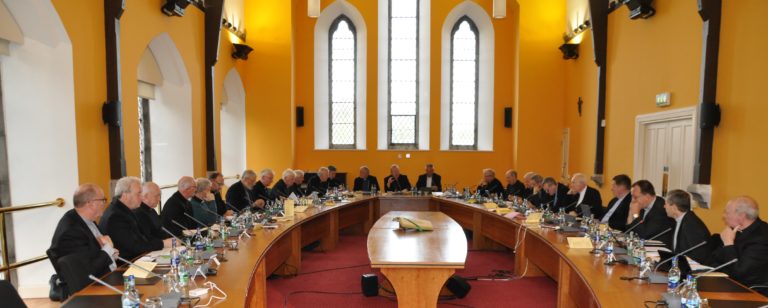With the unquantifible threat of the Coronavirus Covid-19 hanging over the whole island of Ireland, Irish Bishops met for their scheduled spring conference at Maynooth, March 9-11, 2020.
Having already issued liturgical recommendations re the coronavirus in time for Mass celebrations on March 8-9, their statement following the three-day meeting was unusually short.
Confining itself to familiar territory – e.g. Lenten exhortation in solidarity with Pope Francis; the pending Eucharistic Congress in Hungary; objections to legal changes regarding abortion in Northern Ireland; the NBSCCC and child safeguarding – the bishops’ statement made no mention of the issue of co-responsibility in the Irish church, an issue that will determine whether the church has any future.
The full March statement can be found by clicking here.
And ACI has STILL not received a response form the ICBC that goes beyond a ‘Thanks for all this paper and print!’
With clerical numbers in free-fall, the need for lay people to become far more active and prominent in church life has been urged at the church’s summit for decades, and has been accepted in principle by many if not most Irish bishops. An exploratory pilot study of the prevalence of co-responsibility, undertaken by ACI in 2018-19 and presented to the Irish Bishops in the autumn of 2019, was acknowledged by the secretary to their conference before Christmas 2019.
As the study pointed strongly to the likelihood of an absence of co-responsibility in most parishes in Ireland – and even a shortage of priestly support for the policy – ACI strongly urged the need for an exhaustive survey to establish the full facts. The ACI steering group had hoped for news of this proposal – or at least for news of a discussion of the issue – following the bishops’ March meeting.
Instead neither co-responsibility nor the crisis of priestly manpower receive a mention in the statement issued by the conference on March 12th, 2020, making it anyone’s guess as to what this means. With Covid-19 wreaking havoc among clergy in Italy, this is ominous.
We could all do with at least an assurance that the lay Irish people of God will soon be being taken – at long last – into the confidence of their bishops on matters that vitally affect the future of their church. A blanking of a highly responsible presentation from ACI is the very antithesis of co-responsibility – a continuation of the longstanding Irish clerical administrative habit of keeping everyone in the dark. We could have had far more encouraging news just now, when that very thing is in such short supply.
But perhaps this is already on the agenda of the Father who gets frustrated when the People of God are kept captive by an overbearing power?
Sean O’Conaill, 12-03-2020


Sean, the news from the Spring meeting of the ICBC is very disappointing but,to be totally honest, it is not unexpected. We have grown accustomed over many years to the inertia of our episcopal leaders – with a few honourable exceptions.
I think the question we must now pose for ourselves is -how do we respond to the continuing inaction of the bishops? Do we wait for an initiative that may never materialise or do we, [can we], look elsewhere for a solution? I think we know at this stage that we must look to ourselves [as lay people of God] to chart a way forward. In this regard I draw encouragement from initiatives underway, or planned, in other countries facing similar challenges.
You’re right of course Noel. And Hans Zollner’s suggestion that ‘paternalism’ might describe also that lay over-expectation of bishops is worth thinking about also. He seems to think we need to see ‘paternalism’ as a phenomenon particular to bishops and a lay over-dependence upon them. (See News Item re ‘Paternalism’.)
Maybe we need a special form of family therapy that can help us understand the dysfunctional relationships we have inherited in the Irish church, and to outgrow them?